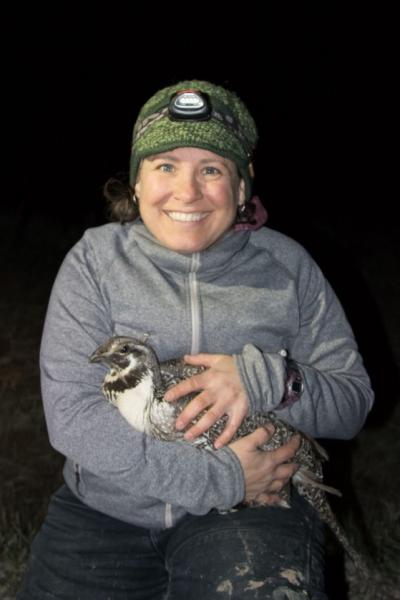Robots, Telemetry, & the Sex Lives of Wild Birds: Using technology to study courtship and conservation
Dr. Gail Patricelli

Tuesday, July 9, 2019
7:30-8:30 PM
Gates Lecture Hall
Off Campus Location
Dr. Gail Patricelli, professor in the department of Evolution & Ecology and chair of the Animal Behavior Graduate Group at UC Davis, is giving the Hann Endowed Lecture in Ornithology at the U-M Biological Station. The lecture is open to students, faculty, researchers, and the public.
Dr. Patricelli's research interests include behavioral ecology, bioacoustics, and conservation in birds, with a focus on understanding the diversity and complexity in animals signals. Current projects address breeding behaviors, sexual selection, acoustic communication, and the effects of noise pollution on sage-grouse and other wildlife.
Per her UC Davis lab website:
"The signals used by animals to communicate are among the most beautiful features of the natural world, including a dizzying array of sounds, smells, colors, dances, electrical fields and seismic vibrations. Research in the Patricelli Lab addresses the function of these signals and why they take on such diverse and complex forms. Our approach has been integrative, examining functional, environmental and mechanistic influences on signal content and design. One of the central goals of research in the lab is to understand how signals are influenced by the social and environmental contexts in which they are used. To accomplish this, we have pioneered new techniques and technologies for the detailed observation and experimental manipulation of both visual and acoustic signals in the field, including biomimetic robots and microphone arrays."
Dr. Patricelli's research interests include behavioral ecology, bioacoustics, and conservation in birds, with a focus on understanding the diversity and complexity in animals signals. Current projects address breeding behaviors, sexual selection, acoustic communication, and the effects of noise pollution on sage-grouse and other wildlife.
Per her UC Davis lab website:
"The signals used by animals to communicate are among the most beautiful features of the natural world, including a dizzying array of sounds, smells, colors, dances, electrical fields and seismic vibrations. Research in the Patricelli Lab addresses the function of these signals and why they take on such diverse and complex forms. Our approach has been integrative, examining functional, environmental and mechanistic influences on signal content and design. One of the central goals of research in the lab is to understand how signals are influenced by the social and environmental contexts in which they are used. To accomplish this, we have pioneered new techniques and technologies for the detailed observation and experimental manipulation of both visual and acoustic signals in the field, including biomimetic robots and microphone arrays."
| Building: | Off Campus Location |
|---|---|
| Location: | 9133 Biological Rd, Pellston, MI 49769 |
| Event Type: | Lecture / Discussion |
| Tags: | Biological Station, Biology, Biosciences, Bsbsigns, Ecology, Environment, Life Science, U-m Biological Station, Umbs |
| Source: | Happening @ Michigan from University of Michigan Biological Station |

